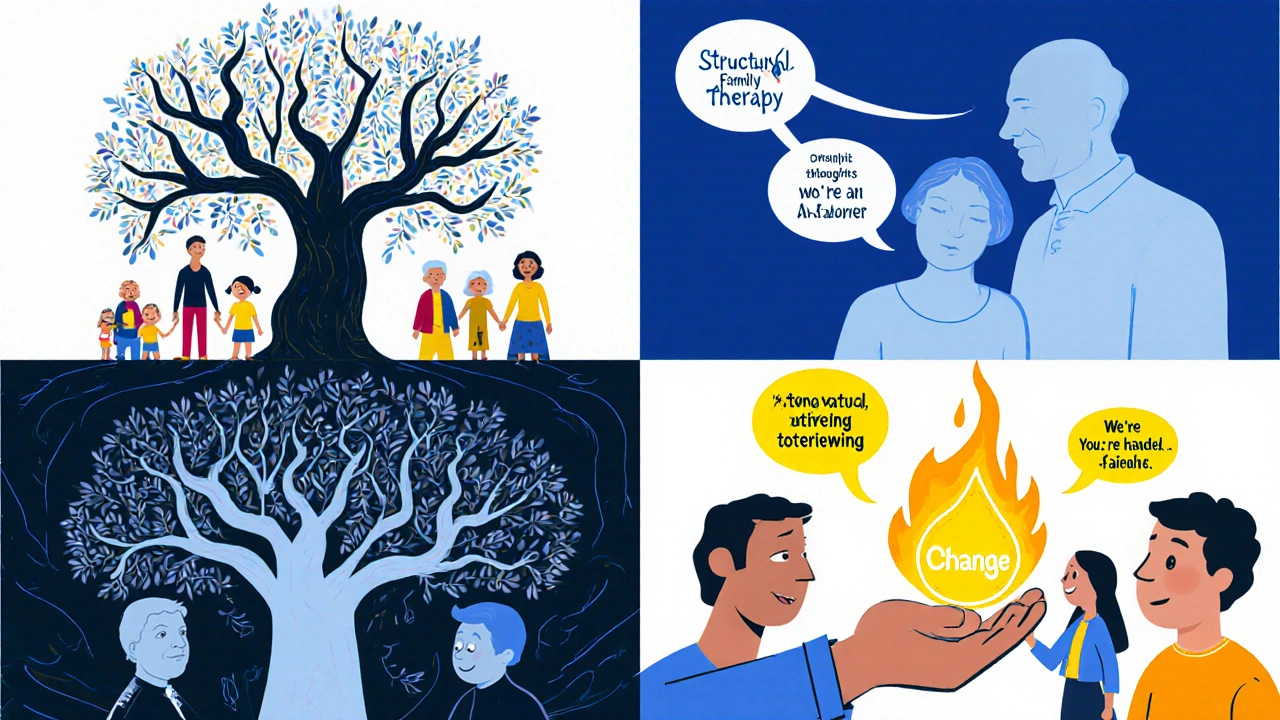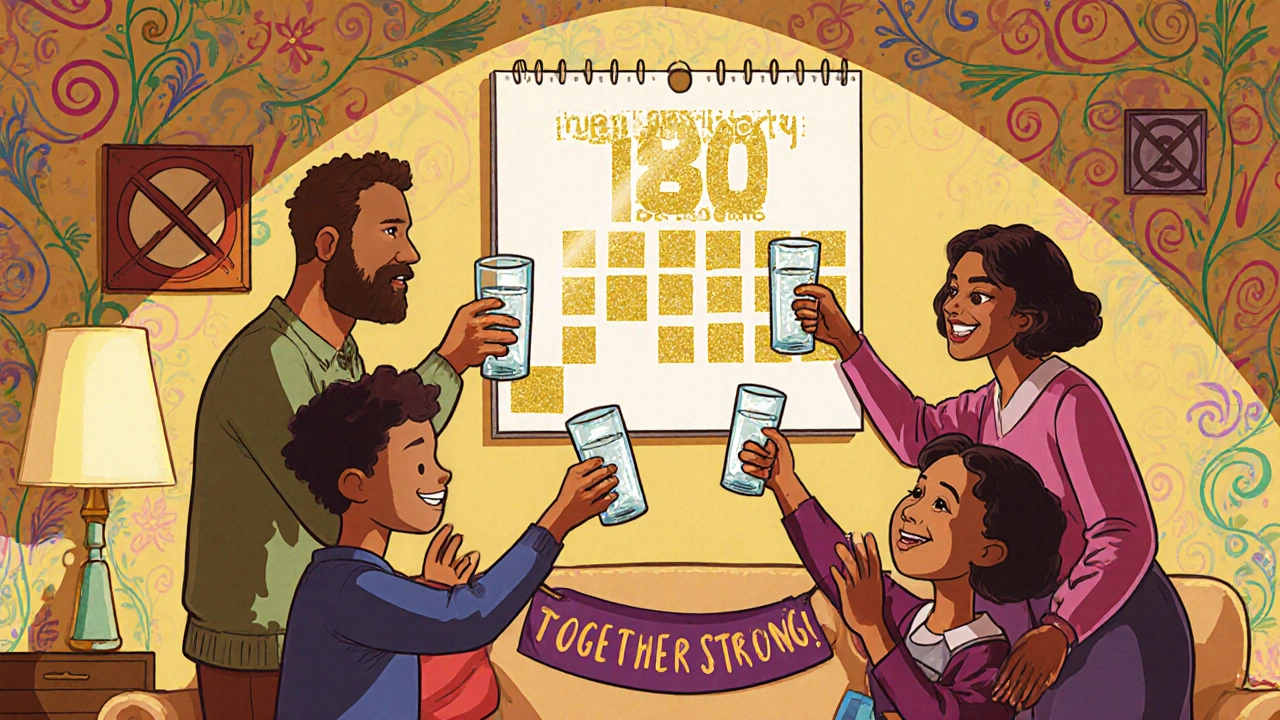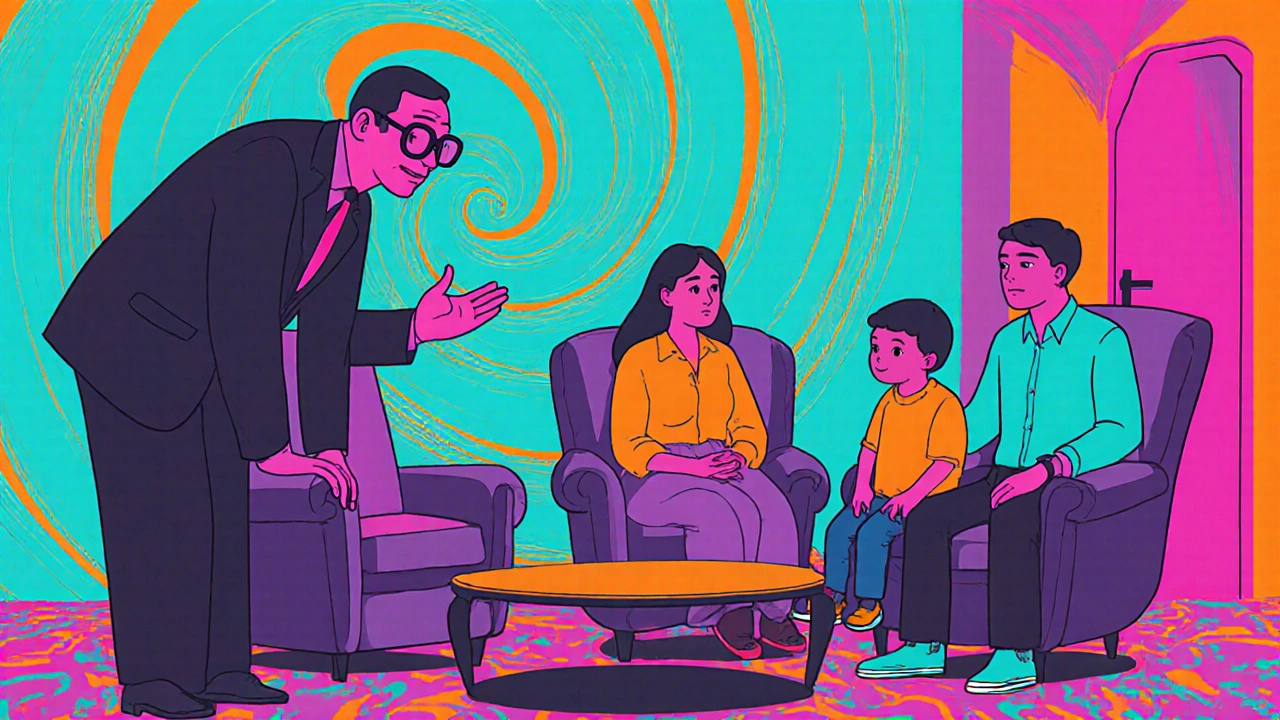Family Therapy Suitability Assessment
This assessment helps determine if family therapy might benefit your alcoholism recovery journey based on key factors mentioned in the article. Answer honestly to get personalized guidance.
When a loved one battles alcohol dependence, the whole household feels the strain. While medical detox and individual counseling are common, family therapy often makes the difference between short‑term sobriety and lasting recovery. This article breaks down why involving the family matters, what techniques therapists use, and how you can get started.
What Family Therapy Is and Why It Matters
Family therapy is a psychological approach that treats the family unit as a system, addressing patterns of interaction that sustain problematic behavior. Instead of focusing solely on the individual who drinks, the therapist looks at communication, boundaries, and roles that may keep the addiction alive.
Understanding Alcoholism as a Family Issue
Alcoholism (or Alcohol Use Disorder) is a chronic disease characterized by an inability to control drinking despite negative consequences. Research shows that 40‑60 % of people with alcoholism report strained family relationships, and those strains often push the drinker deeper into the habit. When families learn healthier ways to interact, they create a stable environment that encourages change.
Key Benefits of Adding Family Therapy to a Treatment Plan
- Improved communication: Families learn to speak without blame, which reduces shame for the person in recovery.
- Shared responsibility: Relatives stop feeling helpless and start playing an active role in relapse prevention.
- Early detection of triggers: When everyone knows the warning signs, they can intervene before a slip becomes a binge.
- Enhanced motivation: Seeing loved ones invest time and effort boosts the drinker’s commitment to stay sober.
Core Techniques Used in Family Therapy for Alcoholism
Therapists draw from several evidence‑based models. Below are the most common approaches you’ll encounter.
- Structural Family Therapy focuses on reorganizing family hierarchy and boundaries, helping parents reclaim authority and children gain appropriate independence.
- Bowenian (Family Systems) Therapy looks at multigenerational patterns, such as how grandparents’ drinking habits influence the current generation.
- Cognitive Behavioral Therapy (CBT) for families teaches all members to identify distorted thoughts (e.g., “You’re a failure because I drink”) and replace them with realistic statements.
- Motivational Interviewing (MI) is used within sessions to boost the drinker’s own desire to change, while the family learns how to support that motivation without pressure.

How Family Therapy Differs from Individual Therapy and 12‑Step Programs
| Aspect | Family Therapy | Individual Therapy | 12‑Step Programs |
|---|---|---|---|
| Primary focus | Family system and interaction patterns | Individual thoughts and behaviors | Peer support and spiritual principles |
| Typical setting | Therapist‑led sessions with 2‑6 family members | One‑on‑one sessions | Group meetings, often open to anyone |
| Key benefit for alcoholism | Reduces enabling behaviors, builds accountability | Develops personal coping strategies | Provides community and long‑term fellowship |
| Evidence base | Meta‑analyses show a 30‑40 % increase in abstinence rates when added to standard care | Strong for co‑occurring mental health issues | Effective for maintenance after early recovery |
When to Choose Family Therapy
Not every person with alcoholism benefits equally from family work. Consider family therapy if:
- There is ongoing conflict or codependency that fuels drinking.
- Multiple family members have a history of substance use or mental health disorders.
- The person in recovery wants family involvement and is open to joint sessions.
- Relatives are willing to attend regularly and practice new skills at home.
If the family is hostile, unsafe, or unwilling to engage, individual therapy or a medically supervised program may be a safer first step.
Getting Started: Practical Steps for Families
- Find a licensed therapist who specializes in addiction‑focused family work. Look for credentials such as LCSW, LMFT, or a certified addiction counselor.
- Schedule an initial assessment. The therapist will ask about drinking patterns, family history, and any co‑occurring conditions.
- Agree on goals. Common objectives include improving communication, establishing clear boundaries, and creating a relapse‑prevention plan.
- Commit to regular sessions (usually weekly or bi‑weekly) for at least 12 weeks. Consistency is key to breaking entrenched patterns.
- Practice skills at home: use “I‑statements,” set limits on alcohol availability, and celebrate small wins together.
Potential Pitfalls and How to Avoid Them
- Blaming the drinker: Shift the focus from “you caused this” to “how can we change the situation together?”
- Skipping homework: Therapy is only as effective as the practice you do between sessions. Keep a simple log of triggers and successes.
- Ignoring co‑occurring issues: Depression, anxiety, or trauma often hide behind alcohol use. Ask the therapist to screen for these and incorporate appropriate treatment.
- Over‑reliance on one approach: Some families benefit from mixing Structural Therapy with CBT techniques. Stay open to a blended plan.

Success Stories: Real‑World Examples
James, a 42‑year‑old accountant, had been drinking heavily for 15 years. After a failed attempt at rehab, his wife encouraged them to try family therapy. Within three months, they re‑established a clear rule: no alcohol in the house after 6 pm. James learned to discuss stress at work without reaching for a beer, and his children felt safe sharing their feelings again. Six months later, James reported 180 consecutive sober days.
Maria’s teenage son, Luis, began binge drinking after a sports injury. Maria and her sister attended weekly sessions focused on Structural Therapy. They set consistent bedtime and screen‑time limits, and the therapist helped them express love without judgment. Luis gradually reduced his drinking and eventually stopped, crediting the family’s new routine for his change.
What the Research Says
A 2022 meta‑analysis of 34 randomized controlled trials found that adding family therapy to standard treatment increased abstinence rates by an average of 32 % compared to individual therapy alone. Another study published in the Journal of Substance Abuse Treatment reported that families who practiced “open communication drills” reduced relapse risk by 25 % over a 12‑month follow‑up.
Frequently Asked Questions
Is family therapy covered by health insurance?
Many plans cover mental health services, including family therapy, if the provider is in‑network. Check your policy’s mental health benefits and ask the therapist’s office about billing codes.
How long does a typical family therapy program last?
Most programs run 12‑16 weekly sessions, but the length can extend based on progress and the complexity of family dynamics.
Can family therapy work if only one family member attends?
It’s less effective with a single participant, because the core goal is to change interaction patterns. However, even one member can learn skills that later help the whole family.
What if my family lives far apart?
Telehealth options have expanded. Most licensed therapists now offer video sessions, allowing distant relatives to join in real time.
Are there any risks to involving the family?
If family members are abusive or highly volatile, the therapist may recommend separate treatment first. Safety and emotional well‑being are always the top priority.
Next Steps for Anyone Ready to Try Family Therapy
Start by researching local therapists who list "addiction" or "substance‑use" in their specialties. Call a few offices, ask about their experience with alcohol‑related families, and request a brief intake call. Even if you’re unsure, a 30‑minute consultation can clarify whether the approach feels right for your household.
Remember: healing from alcoholism isn’t a solo journey. When the whole family learns to support, communicate, and set healthy boundaries, the odds of sustained recovery jump dramatically. Give family therapy a chance-you might be the missing piece in the puzzle of lasting sobriety.


Benedict Posadas
November 1, 2025 AT 13:26Hey folks, just wanted to shout out how fam therapy can be a total game‑changer for anyone battling booze 🙌 – it brings the whole crew together, builds trust, and you even get some good laughs while learning new coping tricks. Trust me, get everyone in the room and watch the magic happen! 😄 It definatly helped my cousin stop the nightly beer run.
Kiara Gerardino
November 14, 2025 AT 07:00While enthusiasm is appreciated, it's critical to recognize that addiction is a severe disease, not merely a "game‑changer" to be treated with optimism alone. Families must confront uncomfortable truths and avoid enabling behaviors; otherwise, the cycle persists. The moral imperative is to approach therapy with sober seriousness, not festive celebration.
Tim Blümel
November 27, 2025 AT 00:33Family therapy offers a unique lens through which we can view addiction as a relational phenomenon rather than an isolated flaw. By shifting the focus from "the drinker is bad" to "the system has patterns that sustain the behavior," we empower all members to participate in healing. This approach aligns with systems theory, suggesting that any change in one part of the family reverberates throughout the whole. Practically, therapists introduce tools like circular questioning, which uncovers hidden assumptions that keep the cycle alive. They also teach emotional regulation techniques, so that heated arguments don't become triggers for relapse. When a parent learns to set clear boundaries without aggression, children feel safer to express their concerns. Those children, in turn, are less likely to turn to substances as a coping mechanism. The evidence is compelling: meta‑analyses show a 30‑40 % increase in abstinence when family work is added to standard care. Moreover, the collaborative nature of sessions reduces the stigma often associated with seeking help, because the burden is shared. Even in cases where only one family member can attend, the skills they acquire can be disseminated at home, gradually reshaping the environment. Telehealth has further democratized access, allowing distant relatives to join via video and maintain consistency. However, therapists must remain vigilant for signs of abuse or extreme volatility, as forcing participation can cause more harm. In such scenarios, individual counseling for the at‑risk members may precede joint sessions. Ultimately, the goal is not just sobriety but the restoration of healthy communication, trust, and mutual respect. 🌟 By committing to this collective journey, families can become the strongest ally in the recovery process. 😊
Joanne Ponnappa
December 9, 2025 AT 18:06I hear you, and it’s cool how you broke it down so clearly – really makes sense in plain language. Family therapy does sound like a solid step if everyone’s on board.
Michael Vandiver
December 22, 2025 AT 11:40Just jumped in here – totally agree that having the whole fam in the room can change the vibe fast 🚀. I’ve seen a cousin’s sis set up a weekly “no‑alcohol night” after therapy and the house feels lighter. Keep the momentum going! 🎉
Emily Collins
January 4, 2026 AT 05:13Honestly, it’s exhausting listening to people glorify “no‑alcohol nights” when the underlying pain is still there. I’ve been in a family that pretended everything was fine, only to have the crashing reality hit later. The drama never really ends unless we dig deeper.
Harini Prakash
January 16, 2026 AT 22:46Hey, I get the frustration – confronting that hidden pain is tough, but with a therapist guiding the conversation, it can become a safe space to unpack those buried emotions. 🌱 Let’s remember that healing often feels messy before it settles.
Rachael Turner
January 29, 2026 AT 16:20It’s interesting to consider how our cultural narratives around drinking shape family dynamics. In many societies, alcohol is woven into celebrations, making it harder to set boundaries without seeming antisocial. When therapy helps families re‑define those rituals, it can shift the entire social fabric. Also, the role of spirituality or personal meaning attached to drinking shouldn’t be ignored; sometimes the bottle fills a void that therapy can address more sustainably. Ultimately, integrating these perspectives can make the therapeutic process more holistic and effective.
Suryadevan Vasu
February 11, 2026 AT 09:53Concise: Therapy reshapes habits, not just cravings.